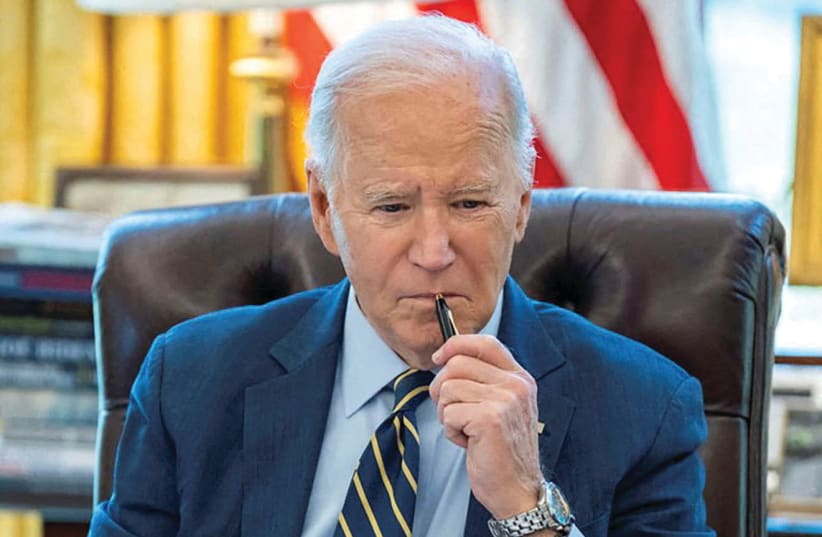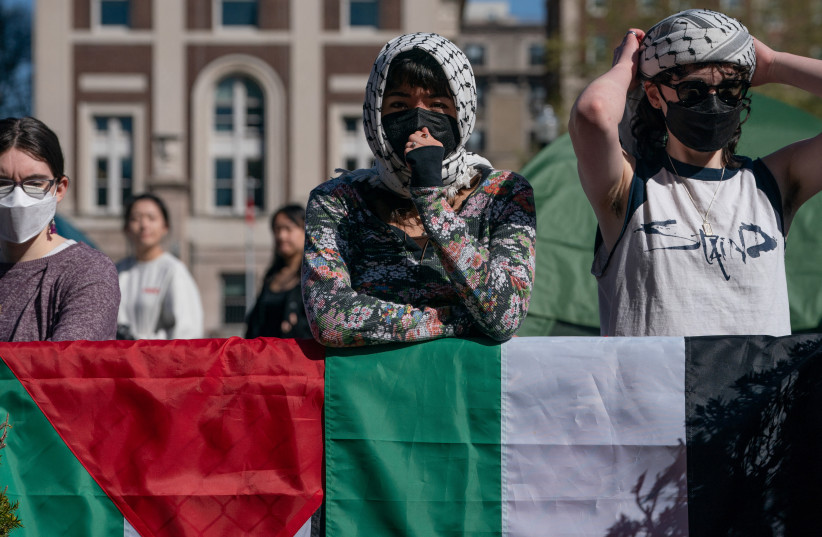At the behest of an early American interfaith organization called the National Conference for Christians and Jews, the US marked its first National Brotherhood Week in 1934 as a national vehicle in the fight against bigotry, racism, and injustice.
Some 30 years later, Tom Lehrer famously lampooned National Brotherhood Week in a song of the same name: “Oh, the poor folks hate the rich folks/ And the rich folks hate the poor folks/ All of my folks hate all of your folks/
It’s American as apple pie,” he sang.
But during National Brotherhood Week, he continued, “New Yorkers love the Puerto Ricans ‘cause it’s very chic/ Step up and shake the hand/ Of someone you can’t stand/ You can tolerate him if you try.”
And then the kicker: “Oh, the Protestants hate the Catholics/ And the Catholics hate the Protestants/ And the Hindus hate the Muslims/ And everybody hates the Jews.”
Lehrer’s sarcasm came to mind Wednesday reading US President Joe Biden’s proclamation declaring May as Jewish American Heritage Month.
“For centuries, the perseverance, hope, and unshakable faith of the Jewish people have inspired people around the world. During Jewish American Heritage Month, we celebrate the immeasurable impact of Jewish values, contributions, and culture on our Nation’s character and recommit to realizing the promise of America for all Jewish Americans,” Biden wrote in his proclamation.
What was so striking about Biden’s proclamation on Jewish American Heritage Month, which is essentially Jewish pride month, is that it is coming at a time when – for the first time in generations – more and more American Jews are feeling the need to hide their Jewish identity. Some hide kippot under baseball caps, some tuck Star of David necklaces under their T-shirts, and some have even taken mezuzot off their doors.
And therein lies the connection with Lehrer’s cynical song: National Brotherhood week at a time when there is no real brotherhood, and Jewish American Heritage Month at a time of a surge of anti-Jewish feeling in the US not seen in decades. Jewish American Heritage Month two months after Franklin Foer wrote a much-discussed piece in the Atlantic entitled: “The Golden Age of American Jews is Ending.”
The US has innumerable commemorative months highlighting the contributions of various ethnic, cultural, and social groups that make up its mosaic. For instance, March is Women’s History Month, September is Hispanic Heritage Month, October is Filipino American History Month, April is Arab American Heritage Month, June is Caribbean American Heritage Month, and on and on.
There are more groups to commemorate than months in the year, and as a result, some months have numerous commemorations. For instance, May, which is Jewish American Heritage Month, is also Older Americans Month, Asian Pacific American Heritage Month, Mental Health Awareness Month, National Bike Month, and more.
How Jewish American Heritage month began
Jewish American Heritage month actually began in 1980 under Jimmy Carter as Jewish Heritage Awareness Week. It was customarily commemorated in a week in April or May, and Carter – in the first proclamation marking the occasion – said the reason is that those months contain “events of special significance to the Jewish calendar: Passover, the anniversary of the Warsaw Ghetto Uprising, Israeli Independence Day, Solidarity Sunday for Soviet Jewry, and the Days of Remembrance of Victims and Survivors of the Holocaust.”
In 2006, the week, by an act of Congress, was upgraded to a month, with President George W. Bush being the first to issue a proclamation declaring it so. Each year since 2006 the president issues such a proclamation, and these have reflected to some extent both the personality of the president as well as something of the times.
Bush’s proclamations were pretty unremarkable, noting the contribution US Jews have made to American society since the first landing in New Amsterdam in 1654 of 23 Jewish refugees seeking “a place of promise where they could practice their faith in freedom and live in liberty. As a nation of immigrants, the United States is better and stronger because Jewish people from all over the world have chosen to become American.”
Barack Obama’s proclamations touched on the same theme, but with a distinct Obamian flair, introducing into these declarations the Jewish commitment to “tikun olam” – a term he made well-known – and stressing the Jews’ contributions to the Civil Rights movement. Obama introduced Rabbi Akiva into one of his proclamations, while Donald Trump quoted Rabbi Tarfon in one of his, and also introduced a little Yiddish into the occasion, saying American Jews have held firm the belief that the US was “di goldene medina (the golden land).”
In the spirit of the just-concluded Passover holiday, the question to be asked now is what made Biden’s proclamation on Tuesday different from all others.
First of all, he referenced the October 7 attacks, the US role in helping defend Israel from the barrage of Iranian missiles and drones two weeks ago, American efforts to release the hostages, humanitarian aid to Gaza and laying the groundwork “for an enduring two-state solution.”
This is the first time a presidential proclamation of Jewish American Heritage Month got into the Mideast weeds.
Secondly, this proclamation was heavier than any of the others when it came to the issue of antisemitism.
Obama was the first president to mention antisemitism in a Jewish American Heritage Month proclamation, doing so in 2014, just a couple of weeks after a former Klansman and neo-Nazi killed three people in shootings at the Kansas City JCC and a nearby Jewish retirement home. He referenced antisemitism again in the proclamations he issued in 2015 and 2016.
Trump first mentioned antisemitism in the proclamation he issued in 2019, following the deadly attacks at the Tree of Life Synagogue in Pittsburgh, and Chabad of Poway near San Diego, and did so the following year as well.
In the first proclamation issued by Biden in 2021, he mentioned antisemitism: “In recent years, Jewish Americans have increasingly been the target of white nationalism and the antisemitic violence it fuels.”
A year later he also mentioned the antisemitism from the Right, saying, “as the scourge of white supremacy and antisemitic violence rises, my Administration remains committed to ensuring that hate has no safe harbor.” He did not mention the antisemitism from the Left.
Biden’s 2023 proclamation was more heavily laden with references to antisemitism than ever before, reflecting the situation in the country. He mentioned attacks on synagogues, bricks thrown through windows of Jewish businesses, Jewish students harassed on college campuses, and “Jews wearing religious attire beaten and shot on streets. Antisemitic conspiracy theories are rampant online, and celebrities are spouting antisemitic hate.” But again, no explicit mention of left-wing or Muslim antisemitism.
And then came Tuesday’s proclamation during which he highlighted what his administration is doing to fight antisemitism and provide security for synagogues, Jewish community centers, and Jewish schools.
“Here at home, too many Jews live with deep pain and fear from the ferocious surge of antisemitism — in our communities; at schools, places of worship, and colleges; and across social media,” he said. “These acts are despicable and echo the worst chapters of human history. They remind us that hate never goes away — it only hides until it is given oxygen. It is our shared moral responsibility to forcefully stand up to antisemitism and to make clear that hate can have no safe harbor in America.”
In a sad sign of the times, Biden spent more time in this declaration bewailing the upsurge in antisemitism than in praising the rich contributions of Jews to American life. This is not because he doesn’t appreciate those contributions, but rather because of an understanding that right now the most pressing concern for American Jews is not to have their past accomplishments recognized, but rather to deal with a degree of intolerance and hatred on some American streets and campuses that they have never experienced before.

